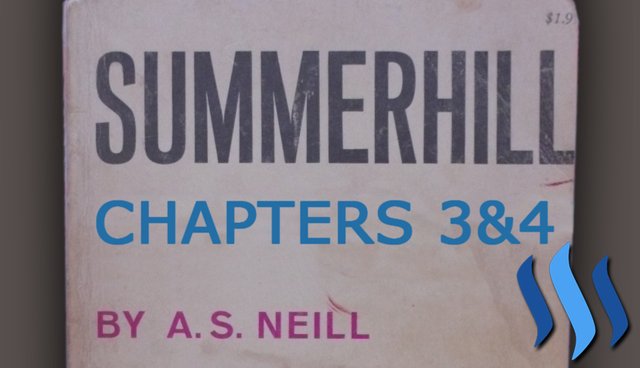A Happy Person is More Successful Than A Rich One - Summerhill Chapters 3 & 4

In a culture where the metric for success is almost always a measure of wealth, a school that prizes liberty and happiness above all must seem quite radical. At Summerhill, lessons and activities are completely optional. If he so desires, a student may spend all of his years there playing—he never has to attend a single class.
This sounds completely insane to me, but I'm trying to keep an open mind. Like many, I was brought up in a state school and now I'm trying to overcome my prejudices and biases against ideas that are different from what I'm used to.
Welcome to the third blog entry of my read-through of Summerhill. I will be going through the book chapter-by-chapter and posting a summery, quotes and my own insights on the content. I will try my hardest to write each blog entry so that it stands on its own—reading the book will not be a requirement, nor will reading any of the previous blog entries.
SUMMERHILL
A Radical Approach to Child Rearing
By A.S. Neill
Part One: Summerhill School
Chapter 3: Summerhill Education vs. Standard Education
Everything about the structure of Summerhill School is based around A.S. Neill's philosophy that the aim of life is to find happiness. The role of education should be to prepare one for life—that doesn't necessarily mean to prepare one to get a high-paying job. Neill believes life preparation is equal to the discovery and cultivation of an interest. If a child is allowed to flourish in their interests rather than being forced to take subjects that he hates, he will be happy and content.
By this standard, our culture and education systems have not been successful. Our schools churn out automatons. Everything about our education, politics and economics create unhappy people who wage war against one another.
None of the subjects taught in school matter one pit compared to the larger question of man's inner happiness. Summerhill allows education to bend to the will of the individual students, rather than the other way around.
How much of our education is real doing, real self-expression? Handwork is too often the making of a pin tray under the eye of an expert. Even the Montessori system, well-known as a system of directed play, is an artificial way of making the child learn by doing. It has nothing creative about it.
(Chapter 3, page 25)
Summerhill is not about forcing children to learn or work a certain way. Neill says that sort of approach to education steals from the child the joy of life, the joy of discovery, the joy of overcoming an obstacle. Worst of all, when a child is always told directly what to do and how to do something, he comes to believe that he is inferior, and must depend of help. Instead, Summerhill allows children to behave like adults and learn what they want to learn, when they want to learn it.
Neill also submits that learning is not the chief virtue of education and growth. Learning for it's own sake does not have much worth. Forcing (or tricking) Billy into learning arithmatic when all he wants to do is be a painter only serves to beat him down. I mention "tricking" because that's the method these play-based schools employ. Learning is seasoned with play to make it palatable.
Caldwell Cook wrote a book called The Play Way, in which he told how he taught English by means of play. It was a fascinating book, full of good things, yet I think it was only a new way of bolstering the theory that learning is of the utmost importance. Cook held that learning was so important that the pill should be sugared with play. This notion that unless a child is learning something the child is wasting his time is nothing less than a curse—a curse that blinds thousands of teachers and most school inspectors.
(Chapter 3, page 27, emphasis added)
In these schools, play is used as a means to an end, and that end is the same as ever before: coercing students into acquiring useless knowledge. Many educators think that it doesn't really matter what a child learns so long as he is taught something. According to Neill, this is the mark of a bad teacher and a bad school.
I'm not sure I entirely agree with Neill's philosophy. I do agree that happiness should be a higher goal than finding knowledge in every subject... however, I think learning, even learning subjects that have no direct "use" in my life, has more value that he's giving it credit for. I love to learn, and the more I learn, the more complete my perspective on the world will be. I think gaining more knowledge is hugely important. But, I'll agree with Neill that it isn't so important that children should be literally or figuratively beaten into submission so that they sit at desks all day studying "useless" facts.
I think it would be wonderful if more children could be brought up as fully formed individuals who are true to themselves AND who also value learning and strive to know as much as they can about the world they live in.
I'll close the chapter with a quote from Neill about the sort of education that's standard in the world, and how useless it is at raising individuals who are fully equipped to face all of life's real challenges:
In all countries, capitalist, socialist, or communist, elaborate schools are built to educate the young. But all the wonderful labs and workshops do nothing to help John or Peter or Ivan surmount the emotional damage and the social evils bred by the pressure on him from his parents, his schoolteachers, and the pressure of the coercive quality of our civilization.
(Chapter 3, page 28)
Chapter 4: What Happens to Summerhill Graduates?
Indeed, what does happen to the graduates? So far we've been waxing philosophical about the value of this or that sort of education vs. another sort. But what do the results look like? At the time of writing (1960), Neill had almost 40 years under his belt at Summerhill. He had seen many students come and go in his time. Here are some of their stories:
Tom came to Summerhill at age five and left at seventeen without ever having attended a single lesson. But he didn't spend all of his time playing and goofing around. He went to the workshop and made things. He never showed a bent toward reading or other academic subjects. But one night, Neill found him in bed reading David Copperfield and asked him who taught him to read. The boy answered, "I taught myself." Later on, Tom got work as a camera operator at a film studio. The employer said he was the best boy they had ever had.
Diane attended lessons throughout her stay at Summerhill, but never showed much interest. Most schools would probably consider her a "poorly educated girl," but she went on to be a successful cook in London. She was highly skilled and came up with new techniques which she demonstrated to others. More importantly, she was happy.
Winifred joined Summerhill at age thirteen. Like many latecomers, she had learned to hate classes from her experience at other schools. She was so joyful when she learned that she was free to never attend a single class. After a few weeks she became quite bored. She wanted to learn something, but she didn't know what. After a few more months she decided that she wanted to pass college entrance exams. None of the subjects were of any particular interest to her, but the aim did interest her.
Not all stories are success stories. There was Barbel, a Swedish student who arrived at Summerhill at the age of fifteen. During her one year at the school she found nothing that interested her. Neill says she had come too late. For ten years of her life teachers had been making up her mind for her and when she finally came to Summerhill she had lost her initiative. But fortunately for her, she was rich and had the promise of a lady's life.
Speaking generally, the method of freedom is almost sure with children under twelve, but children over twelve take a long time to recover from a spoon-fed education.
(Chapter 4, page 34, emphasis added)
And as we saw with Barbel, sometimes they never recover.
Some students show enterprise and others do not. Neill writes that the successes always come from children with good homes. The kind of homes where children are encouraged to be themselves and go after what they love. An authoritarian home will always be in conflict with the teaching at Summerhill, causing the children to face a neverending conflict: Which is right, home or school?
Summerhill may not have produced many "geniuses" in the traditional sense of the word, but it's successes prove that coercion and force are not necessary to create learned individuals.
It is interesting to know that free children take to mathematics. They find joy in geography and in history. Free children cull from the offered subjects only those which interest them.
(Chapter 4, page 31)
Thank you so much for reading. If you're interested in keeping up with this series, please follow me @sethlinson.
~Seth

CITATION
Neill, A.S. Summerhill: A Radical Approach to Child Rearing. New York City: Hart, 1960. Print.
agreed!
I am unschooling my 3 children, 12, 8 & 5 so I can really appreciated this article and book extract. Thank-you for opening some new eyes to how this works and how a child can really learn.
I'm just beginning to learn about unschooling. I'd be interested to know about your approach with your kids.
Do you have young children? I did a post on the first day back to school in September. You can read it here if you want:
https://steemit.com/life/@canadian-coconut/happy-not-back-to-school-day
I'm married, but we aren't planning to have kids for another few years. I'll take a look at your post!